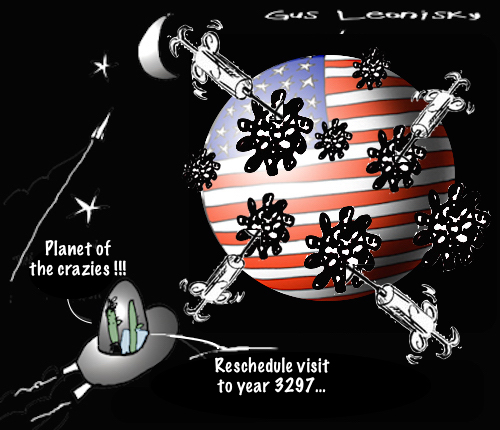Search
Recent comments
- war council.....
4 hours 9 min ago - flying saucers....
4 hours 19 min ago - casualties....
4 hours 31 min ago - dystopian....
5 hours 30 min ago - losses....
6 hours 20 min ago - board of war....
7 hours 42 min ago - help...
9 hours 24 min ago - APOLOGY....
10 hours 2 min ago - humanoids....
12 hours 3 min ago - refugees....
14 hours 3 min ago
Democracy Links
Member's Off-site Blogs
science fiction on planet earth...
 planet
planet
Ada Palmer is a professor of European history at the University of Chicago. Her four-volume science fiction series, Terra Ignota, was inspired by 18th-century philosophers such as Voltaire and Diderot.
“I wanted to write a story that Voltaire might have written if Voltaire had been able to read the last 70 years’ worth of science fiction and have all of those tools at his disposal,” Palmer says in Episode 495 of the Geek’s Guide to the Galaxy podcast.
Palmer says that Voltaire could actually be considered the first science fiction writer, thanks to a piece he wrote in 1752. “Voltaire has a short story called ‘Micromégas,’ in which an alien from Saturn and an alien from a star near Sirius come to Earth, and they are enormous, and they explore the Earth and have trouble finding life-forms because to them a whale is the size of a flea,” she says. “They eventually realize that that tiny little speck of wood on the ground is a ship, and it’s full of living things, and they make contact. So it’s a first-contact story.”
Mary Shelley’s 1818 novel Frankenstein is often considered the first science fiction novel. Voltaire was writing much earlier than Shelley, so does he deserve the title instead? It depends on your definition of science fiction.
“[‘Micromégas’] doesn’t involve technology,” Palmer says, “so if you define science fiction as depending upon technology—and being about, in the Frankenstein sense, ‘Is man’s knowledge giving us access to powers beyond what we’ve had before? What does that mean?’—it isn’t asking that. But aliens and first contact is a very core science fictional element.”
So there’s no clear-cut answer to the question of who should be considered the first science fiction writer. Given a sufficiently loose definition of the term, even a 2nd-century writer like Lucian of Samosata could be a candidate. Ultimately, Palmer says it’s more important to ask the question than to arrive at any particular answer.
Read more:
https://www.wired.com/2022/01/geeks-guide-ada-palmer/
We could even go back further than Voltaire should we choose to study the Greek and Roman Mythologies... But Voltaire was a deliberate science-fiction writer in Micromegas, in which vistors from another solar system visit our little space.... We already have mentioned Micromegas ("verysmall/verybig") on this site... The punch line of the story is a fantastic insight of our dumbdumbness...
FREE JULIAN ASSANGE NOW !!!!!!!!!!
- By Gus Leonisky at 14 Jan 2022 - 4:23pm
- Gus Leonisky's blog
- Login or register to post comments
mundi calefactio incessabilis...
The global temperature was down, thanks to La Niña, but it was still the sixth-hottest year on record. And 2 billion people had their warmest year yet.
TODAY NASA AND NOAA dropped their annual analysis of global temperatures: Last year was tied with 2018 as the sixth-hottest ever, but cooler than 2020. A good sign, right? Yeah, no. Not in the least.
“It's easy to want to focus on that year-to-year variability,” says Bridget Seegers, an oceanographer at NASA. “But it's important to look at the trend: The last eight years were the eight hottest on record.”
To calculate global temperatures, the two agencies pull data from weather stations all over the world, plus measurements taken from ships and buoys in the ocean. Other groups like Berkeley Earth, a nonprofit research organization, do the same with their own somewhat different methodology. But the analyses are nearly identical in their findings. As you can see in the graph below, which compares results from Berkeley Earth, NOAA, NASA, and two other groups in Europe, the global average temperature might have been lower in 2021 than 2020, but it’s still soaring.
One reason for cooler temperatures in 2021 was likely La Niña, a band of cold water in the Pacific. It’s the product of strong trade winds that scour the ocean, pushing the top layer of water toward Asia, causing deeper, colder waters to rush to the surface to fill the void. This in turn influences the atmosphere, for instance changing the jet stream above the United States and leading to more hurricanes in the Atlantic. The sea itself cools things off by absorbing heat from the atmosphere.
The Covid-19 pandemic may have had an additional influence, but not in the way you might think. As the world locked down in 2020, fewer emissions went into the sky, including aerosols that typically reflect some of the sun’s energy back into space. “If you take them away, you make the air cleaner, then that's a slight warming impact on the climate,” said Gavin Schmidt, director of NASA's Goddard Institute for Space Studies, during a Thursday press conference announcing the findings. But as economic activity ramped back up in 2021, so did aerosol pollution, contributing again to that cooling effect. The 2021 temperature drop “may be possibly due to a resumption of activity that produces aerosols in the atmosphere,” Schmidt said.
Read more:
https://www.wired.com/story/the-world-was-cooler-in-2021-than-2020-thats-not-good-news/
FREE JULIAN ASSANGE NOW !!!!!!!!!!!!!!!!!!!!!!!!